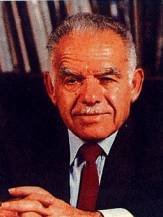Yitzhak Shamir
|
|
Yitzhak Shamir (Hebrew יִצְחָק שָׁמִיר) (born October 15, 1915) was Prime Minister of Israel from 1983 to 1984 and again from 1986 to 1992.
Born in Ruzinoy, Poland, he came to the British Mandate of Palestine in 1935. His family name was Jazernicki but he later changed it to Shamir. Shamir joined the Irgun Zvai Leumi, one of the underground Jewish terrorist organizations directed against the British occupation of Palestine. When the Irgun split in 1940, Shamir sided with the most militant faction, headed by Avraham Stern, which later became known as the Stern Gang. In 1941 he was imprisoned by British authorities. After Stern was killed by the British in 1942, Shamir escaped from the detention camp and became one of the three leaders of the group in 1943, reforming it as "Lehi". During his tenure, the Lehi was responsible for the 1944 assassination of Britain's minister of state for the Middle East, Lord Moyne, and the 1948 assassination of the United Nations representative in the Middle East, Count Folke Bernadotte, due to their political initiatives for Palestine which clashed with the right-wing views of the Lehi.
After the successful battle for independence, Shamir joined the secret intelligence service (Mossad) (1955-1965) and was first elected to the Knesset in 1973. He became chairman of the Knesset in 1977, and foreign minister in 1980, before succeeding Menachem Begin as prime minister in 1983.
Although Shamir had a reputation as a Likud hard-liner, in 1977 he presided at the visit of Egyptian President Anwar Sadat and the peace talks; in 1981 and 1982 he guided negotiations with Egypt to normalize relations after the treaty and directed negotiations which led to the 1983 agreement with Lebanon (never ratified by the Lebanese government).
His failure to stabilize Israel's inflationary economy led to an indecisive election in 1984, after which a coalition was formed between his Likud Party and the Labor Party, led by Shimon Peres. Peres agreed to be prime minister until September 1986, when Shamir took over.
As he prepared to reclaim the office of prime minister, which he had held previously from October 1983 to September 1984, Shamir's hard-line image appeared to moderate. Reelected in 1988, Shamir and Peres formed a new coalition government until 1990, when the Labor party left the government, leaving Shamir with a narrow coalition.
In 1991 the Shamir government took part in the Madrid peace talks and ordered the rescue of thousands of Ethiopian Jews, the Operation Solomon. The Shamir government also decided not to retaliate after the unprovoked Iraqi Scud missile volleys (many of which struck Israeli population centers) during the First Gulf War. The United States urged restraint, saying Israeli attacks would jeopardize the delicate Arab-Western coalition assembled against Iraq. Although long a hard-liner, Shamir left office in 1992, after his government fell amid charges that Likud—by taking part in the Madrid Peace Conference—had effectively agreed to enter negotiations over the West Bank and Gaza.
Shamir and many other Israelis consider the West Bank as an integral part of the land of Israel, and reject the notion of an independent Palestinian Arab state in this territory. Israeli opponents of this view contend that it will lead to continued repression of the Palestinian Arabs and demographic catastrophe (with Arab population growth rates being much higher than that of the Israelis), possibly ending with a dual nationality state replacing the current character of Israel as a Jewish democracy.
Shamir never properly answered these issues. Some opinions suggest that he contended to wait for a suitable time and circumstances politically fruitful for transferring Arab population abroad.
Nevertheless, only a staunch minority in Israel advocate the forceful removal of Arab inhabitants or even Israeli annexation of the West bank and Gaza territories, and Shamir has shown some pragmatism by refusing, as Prime Minister, to promote such an annexation, and in his support of Israeli participation in the Madrid Peace Conference, although without making any major ideological concessions.
Likud's Yitzhak Shamir was succeeded by Labour's Yitzhak Rabin who also sincerely believed that the West Bank rightfully belongs to Jews not to the Arabs. However, unlike Shamir, Rabin was willing to relinquish the West Bank and Gaza in exchange for peace with the Arabs, especially the Palestinians.
Shamir stepped down from Likud leadership in March, 1993. He was a sharp critic of his Likud successor, Benjamin Netanyahu, as being too indecisive in dealing with the Palestinians.
| Preceded in first term by: Menachem Begin |
Prime Ministers of Israel | Succeeded in first term by: Shimon Peres |
| Preceded in second term by: Shimon Peres |
Succeeded in second term by: Yitzhak Rabin |
de:Jitzhak Schamir fr:Yitzhak Shamir id:Yitzhak Shamir he:יצחק שמיר nl:Yitzhak Shamir sr:Јицак Шамир

